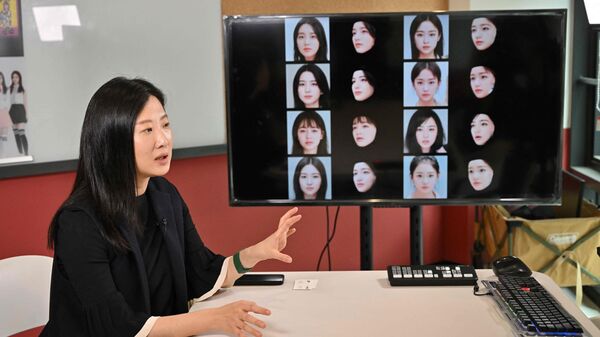Her face is a deep fake. Her body belongs to a team of similar-sized actors. But she sings, reads the news, and sells luxury clothes on TV as AI humans go mainstream in South Korea.
Meet Zaein, one of South Korea’s most active virtual humans, who was created by Pulse9, an artificial intelligence company that is working to bring corporate dreams of the perfect employee to life.
Pulse9 has created digital humans for some of South Korea’s largest conglomerates, including Shinsegae, with research indicating the global market for such life-like creations could reach $527 billion by 2030.
In South Korea, AI humans have enrolled as students at universities, interned at major companies, and appear regularly on live television driving sellouts of products from food to luxury handbag.
But Pulse9 says this is only the beginning. They are “working on developing the technology to broaden AI human use”, Park Ji-eun, the company’s CEO, told AFP.

“Virtual humans are basically capable of carrying out much of what real people do,” she said, adding that the current level of AI technology means humans are still needed for now.
The demand for AI humans in South Korea was initially driven by the K-pop industry, with the idea of a virtual idol – not prone to scandals and able to work 24/7 – proving popular with the country’s notoriously hard-driving music agencies.
Experts around the world, including AI pioneers, have spoken out about its dangers, and several countries are seeking regulation of the powerful but high-risk invention.
But Park is not concerned. Her company is working on new virtual idols, virtual influencers, and virtual sales agents to take over customer-facing tasks for South Korean conglomerates, which are increasingly struggling with recruitment in the low-birthrate country.
South Korea — and the world — needs better, clearer regulations on what AI can do, she said, adding that when done properly, the technology can add to “the richness of life”.
The trouble, however, is that a deepfake can “make it impossible to tell what is real and fake”, Kim Myuhng-joo, a professor of information security at Seoul Women’s University, told AFP.
“It’s an egregious tool when used to harm others or put people in trouble. That’s why it’s becoming a problem,” he added.
